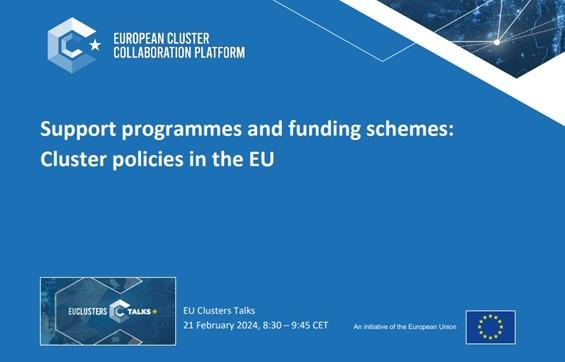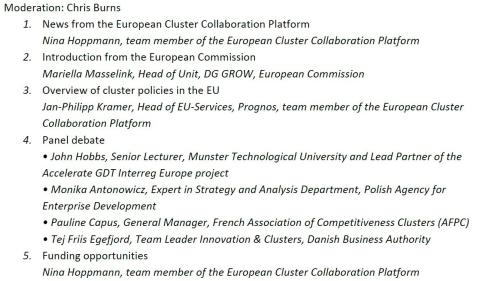Accelerate GDT @ ECCP Cluster Talks – Cluster Policy
The European Cluster Collaboration Platform, on behalf of the European Commission, organised the EU Clusters Talk “Support programmes and funding schemes: Cluster policies in the EU” on 21st of February, 8:30 – 9:45 CET, to give an overview of different cluster policies that exist in the European Union, discuss how they help to develop the future cluster landscape, and analyse what is needed to further enhance the support.
The key messages from the webinar included: the fact that cluster-relevant policies can be distinct cluster policies or broader sectoral policies.
- Over 50% of the EU Member States have dedicated cluster policies at different levels. The cohesion policy programmes are a key funding mechanism where clusters form a key pillar.
- Trends in cluster policies show an increasing use of clusters as institutional infrastructure for addressing grand challenges like the green and digital transition and resilience building, the integration of cluster support with smart specialisation strategies, and the explicit focus on reindustrialisation as a policy goal.
- There are efforts by European projects to harmonise approaches, to learn from each other’s best practices, and to translate those best practices into the own cluster policy landscape.
The event was moderated by the ECCP and brought together 6 experts to discuss the intricacies in different cluster policies that exist across the European Union. The agenda for the webinar is attached below.
Mariella Masselink, Head of Unit, DG GROW, European Commission opened the session and emphasized the importance of having an interactive dialogue on the cluster policies in different countries. She noted that over 50% of EU Member States have over a decade of experience with dedicated cluster policies at various levels. Despite the diverse landscape of cluster policies in the EU, common goals include strengthening innovation ecosystems, fostering links between research and industry, supporting SMEs in transitions, boosting internationalisation, and upskilling the workforce.
The partners all have different strategic national/regional policy context for clusters and Dr Hobbs shared insights from policy in Ireland, Catalonia, Piedmont, Austria, Hungary, Czech Republic and North Rhine-Westphalia:
• Ireland: A national cluster programme is currently being developed.
• Spain: Catalonia, with 30 years of experience in clustering, runs one of the longest-standing programs internationally, focusing on cluster training, management, and collaboration.
• Italy: The Piedmont region supports seven large regional clusters using European Regional Development Fund (ERDF) funding mechanisms.
• Austria: The investment agency connects different clusters at regional levels, utilizing both ERDF and regional innovation funding across various programmes.
• Hungary: Launch of a new centralised national-level program for cluster development.
• Czech Republic: The innovation agency runs a cluster collaboration programme, mainly focusing on SME competitiveness with aspirations to develop a dedicated regional cluster programme.
• Germany: The business and innovation organisation supports regional programmes and the development of new clusters, particularly in the green transition area.
Dr Hobbs outlined how Accelerate GDT offers opportunities to share good practices and learn from each other. This includes workshops, seminars, and webinars where local stakeholders and clusters present their practices. The policy learning platform of Interreg Europe further disseminates these good practices, making them accessible to a broader audience both inside and outside Europe.
The panel session at the end of the webinar sought to understand how the participants see the future development of cluster policies, John Hobbs, highlighted the effectiveness of cluster policies in Europe. “Experienced countries and regions serve as a model for how cluster policies can be developed and managed effectively, and other countries can draw inspiration from such examples to better integrate various government policies. By connecting smart specialisation strategies with cluster policies and educational and training policies, a more cohesive and supportive framework could be established.”
For further information on the European Cluster Collaboration Platform please visit their website https://clustercollaboration.eu/.

